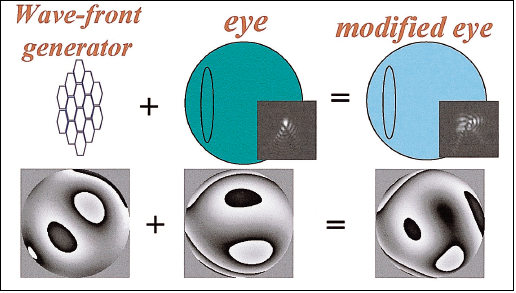Purpose: To develop a prototype instrument that uses adaptive optics to introduce virtually any desired aberration profile in a subject’s eye. At the same time, the instrument could be used to evaluate the subject’s spatial vision for each controlled aberration profile. This “aberration testing station” or “visual simulator” allows us to study the relationship between specific aberrations and visual quality.
Methods: The apparatus uses infrared light to measure the wavefront aberration of the system plus the eye with a Hartmann-Shack wavefront sensor. Defocus is added (or removed) with a computer- controlled, motorized optometer, while higher order aberrations are introduced by a 37-channel membrane deformable mirror. A parallel viewing channel is used for visual testing with the instrument. Visual acuity, contrast sensitivity, and other visual tests are performed under normal viewing for each desired aberration profile.
Results: The range of defocus that can be added is nearly unlimited, while the maximum amount of other aberration modes is restricted to approximately 0.5 μm, depending on mode. Pure modes or any selected combination of modes can be produced with high repeatability and precision (usually better than 0.05 μm), and the system works for pupil diameters up to 6 mm (with a natural pupil).
Conclusions: The adaptive optics visual simulator is a powerful, non-invasive tool to evaluate how aberrations affect vision. In addition, it can be used for the interactive design and testing of new ophthalmic devices, and for the simulation of visual outcomes in customized refractive surgery.
Buscar
Categorías
Archivos
- diciembre 2025 (2)
- octubre 2025 (7)
- junio 2025 (2)
- mayo 2025 (1)
- marzo 2025 (4)
- diciembre 2024 (4)
- octubre 2024 (5)
- septiembre 2024 (1)
- julio 2024 (8)
- junio 2024 (1)
- mayo 2024 (1)
- marzo 2024 (1)
- octubre 2023 (2)
- julio 2023 (5)
- junio 2023 (1)
- julio 2022 (10)
- mayo 2022 (1)
- marzo 2022 (1)
- julio 2021 (5)
- marzo 2021 (2)
- octubre 2020 (36)
- septiembre 2020 (122)
- agosto 2020 (10)
- julio 2020 (38)
- abril 2020 (1)
- diciembre 2019 (1)
- abril 2018 (1)
- septiembre 2017 (2)

Adaptive Optics Visual Simulator
- Voptica
- Publicaciones de VAO
Journal:
Journal of Refractive Surgery
Year:
2002
Link:
Authors:
Enrique J. Fernández, Silvestre Manzanera, Patricia Piers, Pablo Artal